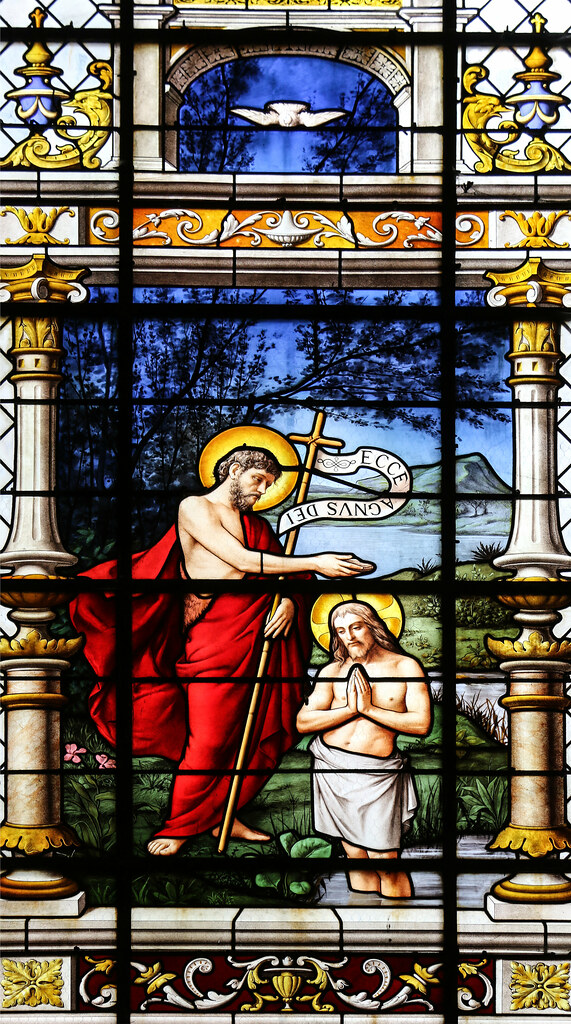Prophets and Prophecy
by Sr Tamsin Geach o.p.
 As it says in the section of the letter of St Paul to the Romans that we read on the 2nd Sunday of Advent, 'Everything that was written long ago in the scriptures was meant to teach us something about hope from the examples scripture gives of how people who did not give up were helped by God.' This second Sunday of Advent we are given the figure of John the Baptist in the Gospel. John 'wore a garment made of camel-hair with a leather belt round his waist, and his food was locusts and wild honey' Matthew adds that John is to be identified as the one spoken of in Isaiah who will 'Prepare a way for the Lord, make his paths straight.’
As it says in the section of the letter of St Paul to the Romans that we read on the 2nd Sunday of Advent, 'Everything that was written long ago in the scriptures was meant to teach us something about hope from the examples scripture gives of how people who did not give up were helped by God.' This second Sunday of Advent we are given the figure of John the Baptist in the Gospel. John 'wore a garment made of camel-hair with a leather belt round his waist, and his food was locusts and wild honey' Matthew adds that John is to be identified as the one spoken of in Isaiah who will 'Prepare a way for the Lord, make his paths straight.’
Traditionally, based on this and other Gospel accounts John the Baptist is seen in a prophetic role, so I thought tonight we would explore the concept of prophecy - particularly as on most Sundays of the year we hear a reading from one or other of the Old Testament prophets, but also to open up what is meant when John is seen as the last of them.
In the Old Testament the first five books are called the books of the law, the Jewish Torah. They are followed by books which are broadly speaking historical, from Judges to Maccabees, then the wisdom literature, including the psalms, and then the prophets. There are 18 prophetical books from Isaiah to Malachi.
Prophecy is the discernment of God's action and communication of His message at a crisis point in history. A prophet receives a revelation arising from an intensely personal experience and drawn from his personal life experience, but for proclamation to others. It may (indeed usually does) contain a warning or a prophecy about the future, but the primary purpose is to proclaim – to speak out what God has laid upon the prophet to announce. Each of the prophets is committed to the renewal of covenant within the Israel of his own generation, has a particular thing that he is as it were ‘shouting about’ but yet preaches a message that has some universal dimension: So Amos and Hosea confronted a society whose primary values were being undermined by materialism and idolatry; Isaiah and Micah prophesied against a backdrop of international and national instability and confusion; Zephaniah, Nahum and Habakkuk preached in a society that had lost its sense of God, with a loss of integrity that spilled out in violence; Jeremiah and Ezekiel traced the destruction of Israel and the disaster of exile; The second part of Isaiah points out the redemptive power of suffering, while Haggai and Zechariah trace the process of rebuilding and growth. As the BBC says, other prophets are available, but from this overview one can see that God sent the prophets at times of national crisis to call to repentance, to exhort, to comfort and to sustain and call to glory.
Each of the prophets has a Christological message – a word about the Messiah who was to come. Isaiah for example prophesies the virginal conception of Our Lord ’A maiden shall conceive and bear a son’ (Isa.7.14) His Passion death, and His resurrection(Isa.53) One of the features of Matthew that we will come back to in later sessions is that he loves to show how all aspects of Jesus’ life were prophesied beforehand. Here he begins that process: He states that John ‘Was the man the prophet Isaiah spoke of’. John the Baptist’s entire life-story, from when his birth is prophesied by the angel Gabriel (Luke 1.11 ff.) through to his execution by Herod (Matt.14.18) has all the hall-marks of the life-line of a a prophet. Jesus Himself refers to him as being equivalent to Elijah (Matt.17.12), who was supposed to return as a forerunner of the Messiah.
John the Baptist comes at the end of the long line of prophets, the last before the coming Messiah. His role is to 'Make straight the way of the Lord.' In some way he sums up and recapitulates the message of all his predecessors: On the one hand he calls the sinners to repentance, warning them of the 'retribution that is coming' but on the other hand he comes with the promise that 'the one who follows me is more powerful than I am, and I am not fit to carry his sandals; he will baptise you with the Holy Spirit and fire.' He not only foretells the coming Messiah, but later in the Gospel of Matthew he is destined to see and recognise Him as such.
Later in the Gospel Jesus says of John 'Truly I tell you, among those born of women there has risen no one greater than John the Baptist. Yet even the least in the kingdom of heaven is greater than he.' The time of prophecy has now ended - we are called to preach in a world similarly broken and dysfunctional to that of the Old Testament, but unlike John and his precursors we preach with the light of Christ.